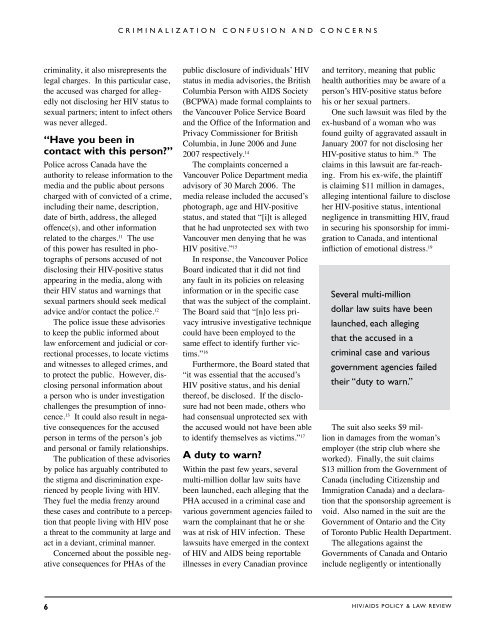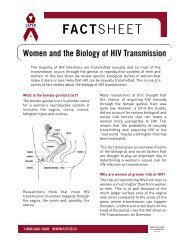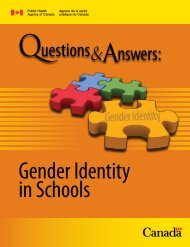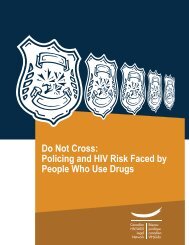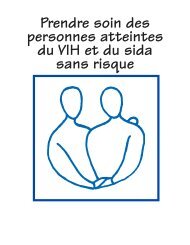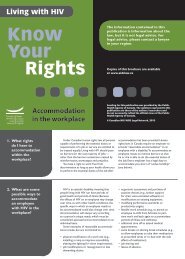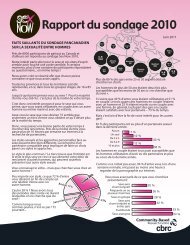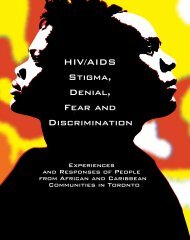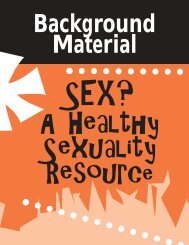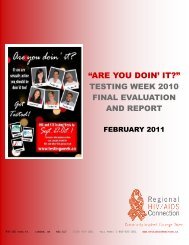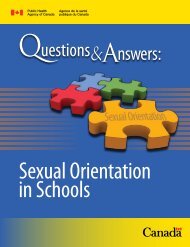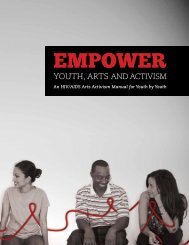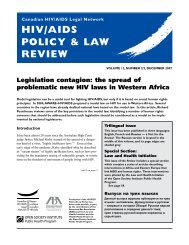HIV/AIDS Policy & Law Review, Volume 14, Number 1 ... - CATIE
HIV/AIDS Policy & Law Review, Volume 14, Number 1 ... - CATIE
HIV/AIDS Policy & Law Review, Volume 14, Number 1 ... - CATIE
Create successful ePaper yourself
Turn your PDF publications into a flip-book with our unique Google optimized e-Paper software.
Criminalization confusion and concerns<br />
criminality, it also misrepresents the<br />
legal charges. In this particular case,<br />
the accused was charged for allegedly<br />
not disclosing her <strong>HIV</strong> status to<br />
sexual partners; intent to infect others<br />
was never alleged.<br />
“Have you been in<br />
contact with this person?”<br />
Police across Canada have the<br />
authority to release information to the<br />
media and the public about persons<br />
charged with of convicted of a crime,<br />
including their name, description,<br />
date of birth, address, the alleged<br />
offence(s), and other information<br />
related to the charges. 11 The use<br />
of this power has resulted in photographs<br />
of persons accused of not<br />
disclosing their <strong>HIV</strong>-positive status<br />
appearing in the media, along with<br />
their <strong>HIV</strong> status and warnings that<br />
sexual partners should seek medical<br />
advice and/or contact the police. 12<br />
The police issue these advisories<br />
to keep the public informed about<br />
law enforcement and judicial or correctional<br />
processes, to locate victims<br />
and witnesses to alleged crimes, and<br />
to protect the public. However, disclosing<br />
personal information about<br />
a person who is under investigation<br />
challenges the presumption of innocence.<br />
13 It could also result in negative<br />
consequences for the accused<br />
person in terms of the person’s job<br />
and personal or family relationships.<br />
The publication of these advisories<br />
by police has arguably contributed to<br />
the stigma and discrimination experienced<br />
by people living with <strong>HIV</strong>.<br />
They fuel the media frenzy around<br />
these cases and contribute to a perception<br />
that people living with <strong>HIV</strong> pose<br />
a threat to the community at large and<br />
act in a deviant, criminal manner.<br />
Concerned about the possible negative<br />
consequences for PHAs of the<br />
public disclosure of individuals’ <strong>HIV</strong><br />
status in media advisories, the British<br />
Columbia Person with <strong>AIDS</strong> Society<br />
(BCPWA) made formal complaints to<br />
the Vancouver Police Service Board<br />
and the Office of the Information and<br />
Privacy Commissioner for British<br />
Columbia, in June 2006 and June<br />
2007 respectively. <strong>14</strong><br />
The complaints concerned a<br />
Vancouver Police Department media<br />
advisory of 30 March 2006. The<br />
media release included the accused’s<br />
photograph, age and <strong>HIV</strong>-positive<br />
status, and stated that “[i]t is alleged<br />
that he had unprotected sex with two<br />
Vancouver men denying that he was<br />
<strong>HIV</strong> positive.” 15<br />
In response, the Vancouver Police<br />
Board indicated that it did not find<br />
any fault in its policies on releasing<br />
information or in the specific case<br />
that was the subject of the complaint.<br />
The Board said that “[n]o less privacy<br />
intrusive investigative technique<br />
could have been employed to the<br />
same effect to identify further victims.”<br />
16<br />
Furthermore, the Board stated that<br />
“it was essential that the accused’s<br />
<strong>HIV</strong> positive status, and his denial<br />
thereof, be disclosed. If the disclosure<br />
had not been made, others who<br />
had consensual unprotected sex with<br />
the accused would not have been able<br />
to identify themselves as victims.” 17<br />
A duty to warn?<br />
Within the past few years, several<br />
multi-million dollar law suits have<br />
been launched, each alleging that the<br />
PHA accused in a criminal case and<br />
various government agencies failed to<br />
warn the complainant that he or she<br />
was at risk of <strong>HIV</strong> infection. These<br />
lawsuits have emerged in the context<br />
of <strong>HIV</strong> and <strong>AIDS</strong> being reportable<br />
illnesses in every Canadian province<br />
and territory, meaning that public<br />
health authorities may be aware of a<br />
person’s <strong>HIV</strong>-positive status before<br />
his or her sexual partners.<br />
One such lawsuit was filed by the<br />
ex-husband of a woman who was<br />
found guilty of aggravated assault in<br />
January 2007 for not disclosing her<br />
<strong>HIV</strong>-positive status to him. 18 The<br />
claims in this lawsuit are far-reaching.<br />
From his ex-wife, the plaintiff<br />
is claiming $11 million in damages,<br />
alleging intentional failure to disclose<br />
her <strong>HIV</strong>-positive status, intentional<br />
negligence in transmitting <strong>HIV</strong>, fraud<br />
in securing his sponsorship for immigration<br />
to Canada, and intentional<br />
infliction of emotional distress. 19<br />
Several multi-million<br />
dollar law suits have been<br />
launched, each alleging<br />
that the accused in a<br />
criminal case and various<br />
government agencies failed<br />
their “duty to warn.”<br />
The suit also seeks $9 million<br />
in damages from the woman’s<br />
employer (the strip club where she<br />
worked). Finally, the suit claims<br />
$13 million from the Government of<br />
Canada (including Citizenship and<br />
Immigration Canada) and a declaration<br />
that the sponsorship agreement is<br />
void. Also named in the suit are the<br />
Government of Ontario and the City<br />
of Toronto Public Health Department.<br />
The allegations against the<br />
Governments of Canada and Ontario<br />
include negligently or intentionally<br />
6 <strong>HIV</strong>/<strong>AIDS</strong> POLICY & LAW REVIEW


